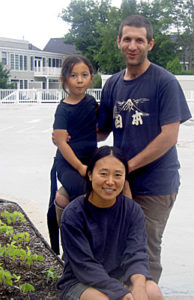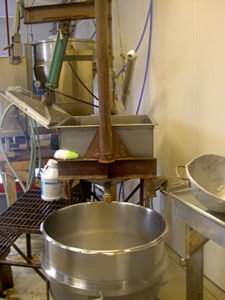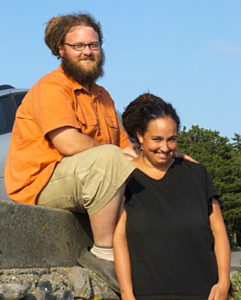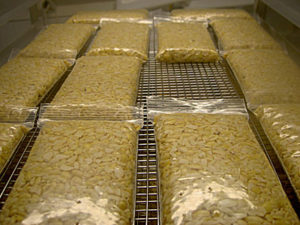 |
| Maho Hisakawa and Jeff Wolovitz and their daughter Ina. Photo by Polly Shyka. |
 |
| Heiwa Tofu production facility at the Knox Mill in Camden. Photo by Polly Shyka. |
By Polly Shyka
Soybeans are not a traditional Maine crop. Most are grown in the Midwest and are a key ingredient in animal feeds. According to the USDA, the United States grew 77 million acres of soybeans in 2009. Of these, 91 percent were genetically engineered (GE) to resist Monsanto’s Roundup herbicide.
The good news, according to The Organic & Non-GMO Report (July 2009), is that U.S. farmers planted 1 million more acres of non-GE soybeans in 2009 than in 2008. Maine farmers have been experimenting with growing GE, non-GE and organic soybeans. Rick Kersbergen of the University of Maine Cooperative Extension estimates that 800 to 1,500 acres of soybeans are growing in Aroostook County this year, and probably 100 to 200 acres in central Maine.
Two Maine families have crafted thriving businesses using locally sourced, non-GE soybeans as their key ingredient. Heiwa Tofu, owned by Maho Hisakawa and Jeff Wolovitz of Lincolnville, is Maine’s only commercial tofu producer. Jaime and Andy Berhanu, Maine’s only commercial tempeh producers, own Lalibela Farm of Dresden.
Wednesdays with Tofu
Heiwa Tofu has a very visible production facility at the Knox Mill in Camden. Every Wednesday, its huge garage door opens to the parking lot of the hopping Camden Farmers’ Market as hundreds of dedicated customers shop, admire and support more than a dozen local farmers and vendors.
Mondays and Wednesdays are tofu making days. When I visited, Wolovitz had rinsed 240 pounds of soybeans the previous day and soaked them overnight. Sometimes he has had to rinse locally grown beans six times, depending on how clean they were at harvest – which depends on how the combine was adjusted and how weedy and flat the fields were, since the combine eats bumps of dirt as well as plant material. Beans from Bob Crowe of Schenectady, N.Y., are cleaned in the field, directly behind the combine, so these gorgeous, creamy white, whole beans need only one rinse. Wolovitz uses these beans while he waits for Maine’s crop to be harvested.
Wolovitz begins grinding the beans in a modified hammer mill at 5 a.m. and creates a fluffy, wet meal. Then he uses a ceiling-mounted winch to lift the giant pot high enough to dump it into a kettle, or steam jacket. The meal cooks for about 25 minutes and then is gravity fed from a 4- by 8-foot elevated workspace down into a pressing vat lined with a sack. A hydraulic press above the vat squeezes the hot mash for 5 minutes, yielding soymilk and a pulpy white residue called okara – the only byproduct aside from the copious water used to rinse and cook the beans. Some okara gets composted at area farms and by Weiwa; some is fed to animals; none goes to the landfill.
Left with a large vat of soymilk, Wolovitz adds 1 cup of food grade gypsum (calcium sulfate), and within 5 minutes the soymilk has coagulated into a shiny, white mass. Wolovitz stirs the curd, breaking it into smaller pieces, and strains out nearly 30 gallons of whey. Then he grabs the two handles of a grand colander and scoops and dumps the curd into four 12- by 18-inch pressing boxes lined with cheesecloth and sitting on a long, sloped drain table. Then he lowers a pressing lid and an ingenious hinged arm from the wall above each box and hangs a 5-gallon bucket on the end of each arm – a simple press. For 40 minutes, Wolovitz cleans and works on the next batch that is working its way down the line.
Once fully pressed, the coagulated soymilk is called tofu. Wolovitz lifts the large slab from its cheesecloth wrapping and settles it into what looks like a large stainless steel saucer on a pedestal. By the end of the long day and seven batches later, Wolovitz turns over the last step to a hired helper. The 24 slabs – 480 pounds of tofu – are removed from the cooling vat, cut into 12- to 16-ounce blocks and packed into water-filled, square, food-grade, 4-gallon buckets, ready for distribution.
In 2009, Heiwa purchased 6 tons of Maine grown beans. In 2010, two Maine farmers, Bob Reisner of Skowhegan and Donny Webb of Pittston, are growing a total of 20 acres for Heiwa. These, Wolovitz hopes, will yield 15 to 20 tons of soybeans and will keep Heiwa in Maine-grown beans until the 2011 harvest.
A few years ago, Wolovitz and Hisakawa had only experimented with tofu made in their home kitchen. In 2008, they started brainstorming ways of “participating in the local food system.
“It didn’t have to be tofu,” says Wolovitz, but in the classic small-state-of-Maine-way, they were soon steered toward Rob Lovell, who had made tofu in Rockport in the ‘70s. Lovell was glad to sell his production set-up and advise the young couple. Nine months after producing their first batch in the Knox Mill facility, Heiwa Tofu’s weekly production had doubled. Crown O’ Maine Organic Cooperative began distributing Heiwa Tofu in July 2009. By July 2010, Heiwa was producing 900 pounds of tofu per week.
“Belfast is the tofu capital of Maine,” says Wolovitz: One-third of Heiwa’s production is sold to businesses in the lovely town that 50 years ago was the unofficial “chicken capital of the world.”
This small, agriculturally linked business fits a weekly rhythm that works for the Hisakawa and Wolovitz family. Their two daughters, especially Ina, age 5, can be with their parents while they run the business. Ina builds okara castles while Wolovitz works. Hisakawa, of Japanese descent, loves having locally produced and utterly fresh tofu for her own table and is proud to offer it to the Maine community. Though Americans tend to eat tofu in larger quantities as a meat substitute, Hisakawa says, “Tofu is a most basic part of Japanese cuisine. Most people there eat a small, maybe 2-ounce, block each day. It is truly loved by all.”
 |
| Jaime and Andy Berhanu of Lalibela Farm in Dresden. Photo by Carolyn MacLeod. |
 |
| Chopped soybeans before fermenting. Photos by Polly Shyka. |
 |
The Tempeh Team
“We got it right the first time,” says Jaime Berhanu, half of the Lalibela Farm Tempeh team. Both vegans, Jaime and Andy tried making tempeh at home and were pleased enough with the results that they began producing tempeh for their Portland Farmers’ Market stand in late 2009.
“The first batches were about 30 pounds, sold in 1/2-pound packages, and we sold out every single time.” Within a few months, they had applied to become vendors at Whole Foods in Portland and were producing 100 pounds per week. Now they produce 300 pounds per week.
Tempeh is a traditional Indonesian food made by culturing soybeans so that they are held together in a meaty block by the mycelium of an edible fungus. In Indonesia, where ambient day and night temperatures are 90 F, cooked soybeans are simply wrapped in banana leaves, and naturally occurring fungi grow to make tempeh.
Andy describes tempeh to prospective customers as “tofu’s meatier cousin.” Soybeans are naturally high in protein, and fermenting the beans makes their indigestible parts available for human metabolism. Natural fermentation produces vitamin B12, so tempeh can be a good vegetarian source of that vital nutrient, often elusive to vegans.
“We always went to the store for our protein,” says Andy. “Providing our local community with fresh, locally made and Maine grown (when possible) protein is a favorite part of our business.”
Making tempeh begins with cleaning and soaking whole soybeans. The Berhanus chop soybeans with a mounted Hobart vegetable slicer and cook the chopped soybeans for 1-1/2 hours until al dente. They add a splash of organic Maine apple cider vinegar, as a little acid aids fermentation. Cooked beans are drained and spread in large trays to cool and dry, and then a tempeh culture, an edible mold spore bought from The Farm in Tennessee, is stirred into the soybeans. Only a fraction of a teaspoon of culture, which looks like black pepper, is needed per large batch.
Cultured beans go into 8-ounce, perforated, elongated zip plastic bags and are rolled flat with a rolling pin and placed in a single layer on industrial baking sheets. The sheets are wheeled into a 92 F, insulated incubation room on a bakery cart and remain there for 17 hours. Then the bags are vacuum packed in another plastic bag, labeled and refrigerated. Removing all oxygen and cooling will stop fermentation – or at least slow it considerably. Refrigerated, this fresh tempeh has a shelf life of 10 days and is distinct from pasteurized tempeh in grocery stores that lasts 45 days.
In 2009, the Berhanus purchased organic soybeans from Henry Perkins of Albion and from Bob Reisner of Skowhegan, the grower with whom Heiwa Tofu has contracted. The Berhanus hand clean their soybeans, picking out foreign seeds, rocks and off-color beans. Like Wolovitz and Hisakawa, they are committed to working with Maine growers whenever possible and to using only GE-free beans. The Berhanus are now growing an acre of soybeans on leased land in Dresden. They began as vegetable growers selling at the Portland Farmers’ Market, but their tempeh has “stolen the show” and now commands much more of their time and energy.
Producing tempeh commercially has involved trial and error. “It wasn’t until we found the tempeh book [Tempeh Production – A Craft and Technical Manual, by William Shurtleff and Akiko Aoyagi] that we realized a lot of our figuring out made sense,” says Jaime. “We were traveling to a certified kitchen in Wiscasset, logging 120 miles per week, and Andy was doing middle-of-the-night tempeh checks. We knew we needed to figure out a processing kitchen here where we were living.”
They calculated that they could rent an apartment space, retrofit it as a certified kitchen and produce tempeh just feet from their home and gardens. This helps juggle farm and tempeh responsibilities and maximizes quality time spent with their two daughters. Like Wolovitz and Hisakawa, the Berhanus love being and working together.
“I get to work for my best friend. I mean, she is the boss, after all!” says Andy, as Jaime shakes her head, smiles and blushes.
Looking Ahead
Both Heiwa Tofu and Lalibela Farm Tempeh have had tremendous reception. The Berhanus recently added a striking black bean tempeh “that looks like cookies and cream ice cream.” They are testing other combinations of beans and grains and are considering marinating, adding herbs or even slicing their tempeh in the future. They were in the process of getting their tempeh production certified organic when we went to press.
Heiwa’s owners have contemplated smoking some of their product or developing a tofu spread. They have decided to stick with tofu, plain and simple, for now. Both families want their businesses to remain manageable, and short-term growth will come from greater efficiency.
By tapping into other cultures’ traditional foods, two Maine businesses have brought Maine grown soybeans to a new level. Through ingenuity, perseverance and muscle, Jaime and Andy Berhanu and Maho Hisakawa and Jeff Wolovitz have graced many a plate with delicious, fresh and beautiful Maine soy products.
About the author: Polly Shyka farms Village Farm in Freedom with her husband, Prentice Grassi, and their three young sons.
